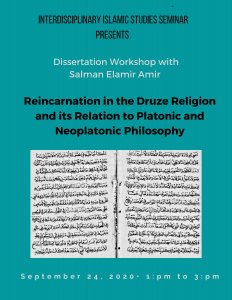Presented By: Global Islamic Studies Center
IISS Dissertation Workshop Series. Reincarnation in the Druze Religion and its Relation to Platonic and Neoplatonic Philosophy
Salman Elamir Amir

IISS is pleased to announce the dissertation workshop "Reincarnation in the Druze Religion and its Relation to Platonic and Neoplatonic Philosophy" with Salman Elamir Amir (Middle East Studies).
“Like Pythagoras, Plato and Neoplatonist philosophers, the Druze believe in metempsychosis. This belief rests on two fundamental principles: (1) the inseparability of body and soul, and (2) the imperative of divine justice. The Druze base their belief of metempsychosis on the teachings of Hamza ibn ‘Alī (985- 1021 A.D. disappeared), the founder of the Druze religion. According to Hamza, when the soul departs from the body upon death, it dwells instantly in a newborn human body and not in other species. This restriction is distinctly different from the teachings of Plato and some of the Neoplatonist philosophers who taught that the human soul could enter the body of a beast.
In my presentation I will discuss the unique concept of reincarnation in the Druze religion and its relation to Neoplatonic philosophy. I will provide evidence of my hypothesis that Iamblichus’ doctrine of metempsychosis reached Hamza b. ‘Ali via Abū Ya‛qūb al-Sijistānī. Even though some scholars like W. Ivanow and H. Corbin as well as later Islamicists have maintained that al- Sijistānī did not teach metempsychosis, it will become clear while scrutinizing al-Sijistānī’s works that, actually, he was teaching a doctrine of metempsychosis in likelihood traceable to Iamblichus. al-Sijistānī says in Kashf al-Mahjūb : “that the species are preserved; that metempsychosis (tanāsukh) always proceeds in one and the same species, never crossing its limits and passing to another species.
I’ll first discuss the theory of reincarnation and then share a real-life story of reincarnation from my ethnographic research in Israel this summer. This story will illustrate how reincarnation remains a living tradition in Druze society today".
“Like Pythagoras, Plato and Neoplatonist philosophers, the Druze believe in metempsychosis. This belief rests on two fundamental principles: (1) the inseparability of body and soul, and (2) the imperative of divine justice. The Druze base their belief of metempsychosis on the teachings of Hamza ibn ‘Alī (985- 1021 A.D. disappeared), the founder of the Druze religion. According to Hamza, when the soul departs from the body upon death, it dwells instantly in a newborn human body and not in other species. This restriction is distinctly different from the teachings of Plato and some of the Neoplatonist philosophers who taught that the human soul could enter the body of a beast.
In my presentation I will discuss the unique concept of reincarnation in the Druze religion and its relation to Neoplatonic philosophy. I will provide evidence of my hypothesis that Iamblichus’ doctrine of metempsychosis reached Hamza b. ‘Ali via Abū Ya‛qūb al-Sijistānī. Even though some scholars like W. Ivanow and H. Corbin as well as later Islamicists have maintained that al- Sijistānī did not teach metempsychosis, it will become clear while scrutinizing al-Sijistānī’s works that, actually, he was teaching a doctrine of metempsychosis in likelihood traceable to Iamblichus. al-Sijistānī says in Kashf al-Mahjūb : “that the species are preserved; that metempsychosis (tanāsukh) always proceeds in one and the same species, never crossing its limits and passing to another species.
I’ll first discuss the theory of reincarnation and then share a real-life story of reincarnation from my ethnographic research in Israel this summer. This story will illustrate how reincarnation remains a living tradition in Druze society today".